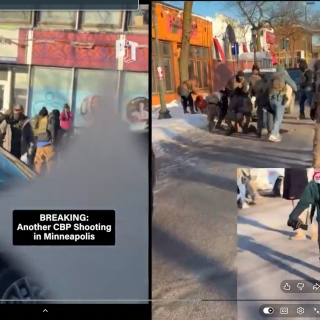Advertisement
Let’s imagine that we’re buying a house for $100,000 with all pennies. That’s 10 million pennies. We begin saving them one at a time, picking up every penny we can. At the same time, another person wants the home and is taking action to stop our dream from coming true. They spend millions of pennies and every $10 they spend could prevent us from collecting one more penny. They enact new laws and another 2.5 million of our pennies no longer qualify. New lines on the map drawn by our opponent disqualify 10% of more of our pennies. Another 250 thousand cannot be used because they made poor spending choices previously. A quarter million pennies are ‘accidentally’ not counted. Our competitor uses media ads to boost their appeal and to falsely undermine ours. Finally, a foreign supporter of our opponent sways another 10% of our pennies away from us.
In the end, when we thought we had ten million pennies, we discover that it is actually less than five million. We still have more pennies than our competition though! Now come ‘Penny Home Buyer Electors’ who have final say in the matter. Although we have the most pennies, and might be the most deserving of the home, the Electors determine the final outcome. They decide the other person should own the home.
This is the nature of politics in America today. Because of unfair laws, practically unlimited donations and the repeal of the Voter Rights Act, a vote isn’t worth much. It’s manipulation of voter numbers over and over again to the point where the numbers cannot be quantified and actually don’t add up or matter much. Sound outrageous? Let’s break it down by category.
Money In Politics
In the 2016 election cycle over 6.5 billion dollars was spent to get candidates elected at the federal level.[1] That’s approximately $4.1 billion for congressional offices and $2.3 billion for the presidency. Toss in another $6 billion for local and state races and we’re looking at a known expenditure of over 12 billion dollars. Money used to sway (or confuse) voters regarding what ballot to cast in a fifteen minute visit to the polling booth.
Political spending is not limited to money raised and spent by candidates and political parties. Political Action Committees (called PACs) are groups formed to raise and spend money in order to support or oppose candidates. A super PAC can raise unlimited sums of money from corporations, unions, associations and individuals, then spend unlimited sums to overtly advocate for or against political candidates and issues. Candidates and parties must file detailed expenditure reports, however independent organizations and unions do not face the same requirement. These groups contribute an increasing percentage of all political spending. In the 2012 election, only about 40 percent of their federal spending was fully disclosed.[2]
Voter Suppression
The 2016 election is the first presidential contest in 50 years without the full protections of the Voting Rights Act, legislation passed in 1965 as part of the civil rights movement and gutted in 2013 by a Supreme Court decision in Shelby County v. Holder. The United States is experiencing the greatest rollback of voting rights in history with 17 states enacting new voting restrictions. These include laws that make it harder to register to vote, cut-backs in early voting and requiring strict forms of government-issued IDs to cast a ballot, which millions of Americans don’t have. It is difficult to determine exact numbers of missing voters. It is probable that upwards of 2.5 million voters were unable to vote in 2016 because of changing polling locations, fewer locations, stricter ID requirements, no pre-registration for 16 & 17 year olds and purging of voter rolls.[3] The majority of these new laws target under-represented segments of society: people of color, the elderly, the infirmed, lower income brackets and youth.
Gerrymandering
Gerrymandering is a practice intended to establish a political advantage for a particular party or group by manipulating district boundaries. In addition to it’s use achieving desired electoral results for a particular party, gerrymandering may be used to help or hinder a particular demographic, such as a political, ethnic, racial, linguistic, religious, or class group.[4] The controlling party in each state has the power to draw district lines thus ensuring their continuing dominance in elections and state control.[5] Many of these gerrymandered districts have been challenged at the state level, then appealed at the federal level with mixed results. The Supreme court has sided both with the states against some gerrymandering and has also refused to make a determination stating that it is “a state issue” not to be determined by the federal government.[6]
Ex-Offender Disenfranchisement
According to KQED News:
“Roughly 6.1 million voting-age American citizens who have been convicted of crimes are restricted from voting in next week's presidential election because of felon disenfranchisement laws.
That's about 2.5 percent of the total U.S. voting-age population – 1 of every 40 adults – that can't vote because of a current or previous felony conviction, according to recent analysis by the Sentencing Project, a criminal justice reform group.
Most of this population is not currently incarcerated. In fact, convicted felons in prison and jail today represent less than 25 percent of the disenfranchised population, according to the report. The vast majority are out of prison and living back in their communities.
More than half of this total disenfranchised population lives in 12 mostly conservative states with the most stringent restrictions. In nine of these states, voting rights are routinely denied to convicted felons who have completed their post-sentence supervision (probation or parole).”[7]
Lost votes
Another unknown is lost or missing votes. It is almost impossible to track the number of votes that never make it to the official tally. What we do know is that ‘lost’ votes do occur and if they are ‘found’ it is most times difficult to get them certified due to voting laws. Dallas County in Iowa failed to report 13% of the votes in the 2016 election. These were absentee ballots that weren’t discovered until 3 months later.[8] Nationally, with over 130 million votes cast in 2016, this equates to possibly 16.9 million lost votes.
Media Manipulation
Political advertising was expected to top $11.4 billion in 2016, with about $105 million targeting online audiences. Many of the targets for these ads were obtained via illegal means.
“A whistleblower has revealed to the Observer how Cambridge Analytica – a company owned by the hedge fund billionaire Robert Mercer, and headed at the time by Trump’s key adviser Steve Bannon – used personal information taken without authorisation in early 2014 to build a system that could profile individual US voters, in order to target them with personalised political advertisements.”[9]
Cambridge Analytica was a British political consulting firm which combined data mining, data brokerage, and data analysis with strategic communication during the electoral processes and closed operations in 2018 in the course of the Facebook–Cambridge Analytica data scandal. [10]
It is quite likely that illegally mined information about facebook users was also sold and used by Russian agents to manipulate the 2019 elections. According to Wikipedia:
“The Russian Government interfered in the 2016 U.S. presidential election with the goal of harming the campaign of Hillary Clinton, boosting the candidacy of Donald Trump, and increasing political and social discord in the United States.
The Internet Research Agency, based in Saint Petersburg and described as a troll farm, created thousands of social media accounts that purported to be Americans supporting radical political groups, and planned or promoted events in support of Trump and against Clinton; they reached millions of social media users between 2013 and 2017. Fabricated articles and disinformation were spread from Russian government-controlled media, and promoted on social media. Additionally, computer hackers affiliated with the Russian military intelligence service (GRU) infiltrated information systems of the Democratic National Committee (DNC), the Democratic Congressional Campaign Committee (DCCC), and Clinton campaign officials, notably chairman John Podesta, and publicly released stolen files and emails through DCLeaks, Guccifer 2.0 and WikiLeaks during the election campaign. Finally, several individuals connected to Russia contacted various Trump campaign associates, offering business opportunities to the Trump Organization and damaging information on Clinton. Russian government officials have denied involvement in any of the hacks or leaks.”[11]
All this equates to illegal activity to obtain personal information about voters, then targeting them with false and inflammatory messaging intending to outrage them and misdirect their vote.
Electoral college
Finally we come to the ongoing controversy of the Electoral College, a system born from the ‘Great Compromise’ of 1787. There were two major group thoughts among the Founders: 1.Congress shouldn’t have the sole power to elect the president, and 2. The People shouldn’t have the sole power to elect the president. From there the electoral college was born.[12] It is part of Article II (Section 1) of the Constitution and has been altered at least ten times with multiple amendments. Many are calling for the abolishment of the Electoral College due to the fact that Presidents have been elected five times by the electors, against the wishes of the majority of the people by popular vote. Hillary Clinton won the popular vote by one million ballots, yet Donald Trump won the election by the Electoral College decision. In essence, people don’t actually vote for the president, they vote for members of the Electoral College who then vote. There is no law forcing electors to follow the will of the popular vote and they can ‘go rogue’ and vote for whomever they choose.[13]
(If you’ve read this far, I imagine your level of discouragement is fairly high at the moment. Mine has been growing exponentially with each election that I have cast a ballot in since 1979. In fact it has reach a peak of disgust that I am no longer part of voting society due to my personal conviction that participation is endorsement. This is not a reasonable option for most folks however. As a veteran I recognize that voting in America, regardless of the issues highlighted above, is a unique right, responsibility and civic duty.)
What can be done? Spending thirty minutes every 6 or 12 months at the polls, achieving great recognition with a sticker that proclaims “I VOTED!” is the minimum expenditure of effort to correct this egregious system. A system where, clearly, none of us is being served well.
*Clearly political finance laws need to change. The obscene amount of money spent to elect an individual is an example of control rather than service.
*Voter turnout should be encouraged, not suppressed. Most countries with a democratic government have automatic voter enrollment. When the resident is of voting age they are automatically registered resulting in high participation.
*Gerrymandering must end. Sensible district boundaries and population distribution equal fair representation for all. Do the candidates you are voting for favor gerrymandering or reform?
*Ex-offenders have served their sentence and are to be considered rehabilitated. There is absolutely no reason not to extend to them voting rights. Furthermore, those serving current sentences should have every right to vote as well. If we want civic minded citizens , we shouldn’t prohibit anyone from participating in the process.
*Streamlining and securing the voting process, especially in the area of absentee voting is crucial to ensuring that each vote has value.
*Reducing the amount of money in politics would effectively reduce the amount of media manipulation too. Learning what propaganda looks like in this very slick and confusing digital age is a necessity to better decision making when it comes to choosing a qualified candidate.
* Awareness of the Electoral College and who your delegates are should be a natural part of voting. Or perhaps we are due for a better system.
*Our country has grown to a point where two ruling parties is not serving the general good. Third parties deserve equal opportunity and access to votes. Diversity within the government representation would be a strength for the people and break the hold of the two party duopoly. Many of the independent candidates and third party platforms already call for the reforms mentioned in this paragraph.
I doubt that I’ll be voting again. I hope that you do though. I’ll be watching to see the outcome. Perhaps we’ll see the restoration of true democracy in America… perhaps not. ~BB
[1] Open Secrets https://www.opensecrets.org/overview/cost.php
[2] BallotPedia https://ballotpedia.org/Money_in_local_elections_(2016)
[3] Rolling Stone https://www.rollingstone.com/politics/politics-news/welcome-to-the-first-presidential-election-since-voting-rights-act-gutted-179737/
[4] Wikipedia https://en.wikipedia.org/wiki/Gerrymandering
[5] Denver Post https://www.denverpost.com/2017/06/25/gerrymandering-2016-election/
[6] The Regulatory Review https://www.theregreview.org/2018/07/17/kang-end-challenges-partisan-gerrymandering/
[7] KQED https://www.kqed.org/lowdown/11897/map-felon-voter-disenfranchisement-by-the-numbers
[8] Des Moine Register https://www.desmoinesregister.com/story/news/politics/2017/02/08/dallas-county-failed-report-5842-votes-cast-2016-election/97665238/
[9] The Guardian https://www.theguardian.com/news/2018/mar/17/cambridge-analytica-facebook-influence-us-election
[10] Wikipedia https://en.wikipedia.org/wiki/Cambridge_Analytica
[11] Wikipedia https://en.wikipedia.org/wiki/Russian_interference_in_the_2016_United_States_elections#Impact_on_election_result
[12] The History Channel https://www.history.com/news/electoral-college-founding-fathers-constitutional-convention
[13] CBS This Morning https://www.cbsnews.com/news/electoral-college-controversy-donald-trump-hillary-clinton-popular-vote/



